CES 2025: Plastic spoon that costs $200, robot puppy, AI barbecue and other curious tech inventions
It looks like a spoon a toddler would grasp and then happily fling. But this spoon will set you back $200 and there’s a very good reason why.
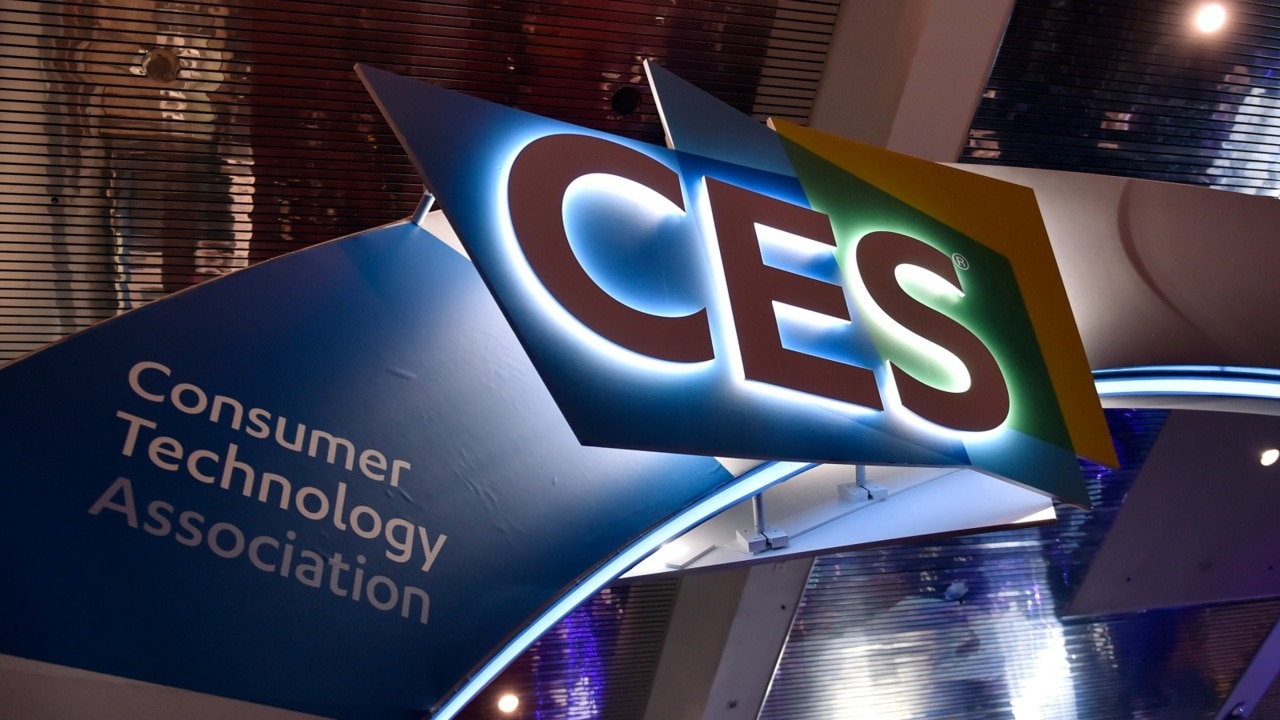
Innovation
Don't miss out on the headlines from Innovation. Followed categories will be added to My News.
To be honest, it doesn’t look all that impressive.
A chunky plastic spoon, maybe something a kid would grasp at dinner and then fail to place it in its mouth spilling mashed up pumpkin all over the kitchen floor.
Yet this spoon will set you back $200 – if it ever makes it to Australia.
That’s because it is definitely not for children. It’s a plastic spoon that could dramatically improve your health, and make you dinner taste nice. Win.
This humble spoon has been one of the hottest launches at CES, the world’s largest technology fair which is currently underway in Las Vegas.
Also attracting oohs and aahs from the tech nerds of the world gathered in Nevada was a robot dog called Jennie, an AI barbecue and a creepy lamp that can walk around your home.

CES is the world’s largest technology fair where big names like LG, Honda, Sony, Samsung, BMW, TCL, Hisense, Panasonic and Bosch launch scores of EVs, fridges, TVs and everything in between.
But it’s also where a whole load of fringe technologies - some very odd and some genuinely groundbreaking – are launched.
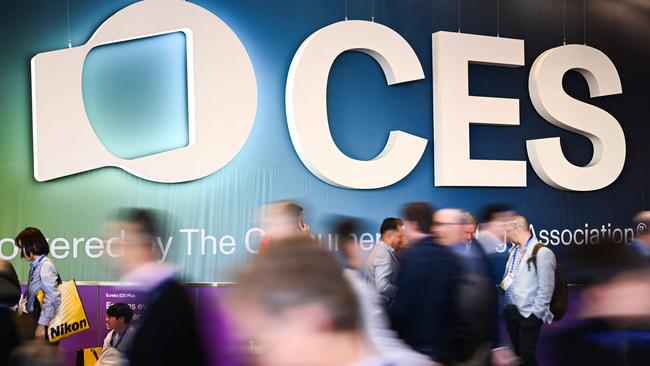
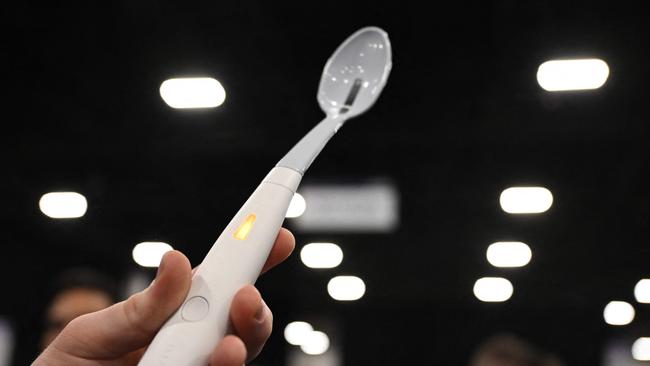
One of these was the Kirin Electric Salt spoon which made its debut outside of Japan at CES.
You may have heard of Kirin, it’s one of Japan’s biggest brewers and in Australia owns Lion, the drinks company Tooheys, Castlemaine and James Squire.
But Kirin’s Kiyohiro Izumo told news.com.au that the company wasn’t just about beer, it was also a large biotech and healthcare firm and it wanted to see if it could encourage people to consume less salt.
Excess salt can lead to health problems from high blood pressure to strokes.

“One of our researchers works in a hospital where many people were told to reduce their salt intake,” he said.
“But people struggle it do this because they get bored and remember the taste of salt.
“So (we thought) why don’t we make that dish taste the same but less salt?”
Enter the Electric Salt. The chunky plastic spoon contains a battery which sends an electrical charge to a metal strip. When a food stuff, like soup, is scoped up by the spoon, passes over the strip and is placed in the mouth, the current attracts sodium ions towards the tongue enhancing, the company says, the “illusion of saltiness”.
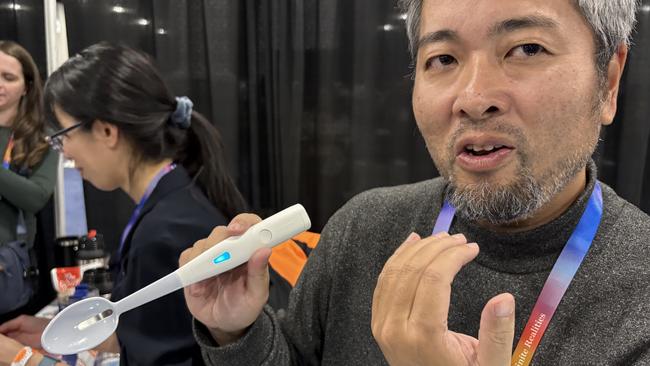
Exciting the ions means even foods with a little salt can taste much saltier.
The company says the charge is so low that it’s undetectable. Nonetheless, it doesn’t recommend touching the spoon’s metal strip directly with your tongue. To do so could bring back childhood memories of sucking a 9 volt battery.
The Electric Salt is on sale in Japan for the equivalent of around $207.
But there’s a wrinkle with the salty spoon – there’s no actual proof it works yet. Not so much in terms of making food taste salty.
Many who tried it a CES were convinced it improved the taste of the simple broth that people were sampling, although news.com.au struggled to tell the difference when trying the soup both with and without the Electric Salt.
But rather, there’s no proof that in practice it reduces people’s salt consumption.
“Unfortunately we haven’t got any evidence yet,” Mr Izumo told news.com.au.
“We still have to do more research if we want to get (US) approval.”
That would likely be the same for Australian approval if it wanted to be sold as a health product. The Electric Salt is for sale in Japan but as Mr Izumo says there are enable to give health “guarantees”.

Robot puppy
Perhaps the most adorable product at CES is a robot Labrador puppy called Jennie from maker Tombot.
Sitting in its basket it can be petted, it raises it head up and down and wags its tail. It can also react to commands and makes real puppy sounds.
The cooing from all and sundry was audible on the conference floor.
Inventor Thomas Steven told news.com.au he had worked with Jim Henson’s Creature Workshop, which made The Muppets, to ensure Jennie was realistic as possible all the way down to the feel of the fur.
But, he said, there was a very serious reason for creating Jennie.
“It was inspired by my mother who has Alzheimer's dementia and we had to take away her dog for safety reasons,” he told news.com.au.
“Jennie is designed to treat the behavioural and psychological symptoms of dementia and reduce the need for certain medications such as psychotropics.
“It stimulates emotional attachment which stimulates positive changes in the brain’s neural chemistry and helps us self-soothe”.
It’s not just people with dementia who might benefit from Jennie, said Mr Steven. Those with depression, PTSD and anxiety could also chill out with a robot puppy.
AI barbecue
Does you barbecue have Wi-Fi and in-built generative AI? No? Well, you’re falling behind in the bragging stakes about grilled steaks.
The Brisk It Zelos 450 Smart Grill launched at CES.
The $640 Smart Grill can notify you of what stage the cook is at and can prompt you to turn your steaks. And if you choose to ignore this advice or forget to take you food off the grill, it will adjust the heat so your bangers don’t get burned.
An accompanying app allows you take a picture of what’s in the fridge and it can generate a recipe.
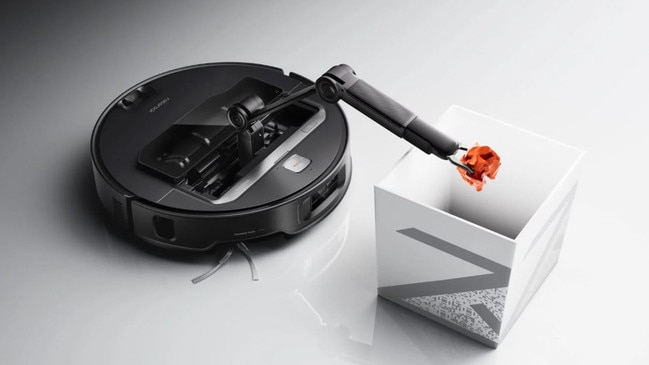
Robot that picks up your dirty undies
The Roborock Saros Z70 turned heads as it trundled through the exhibition.
In essence, it’s your common or garden robot vacuum cleaner. But an arm extending from the circular machine can detect dirty laundry left on the floor, grab it and put it in the wash basket.
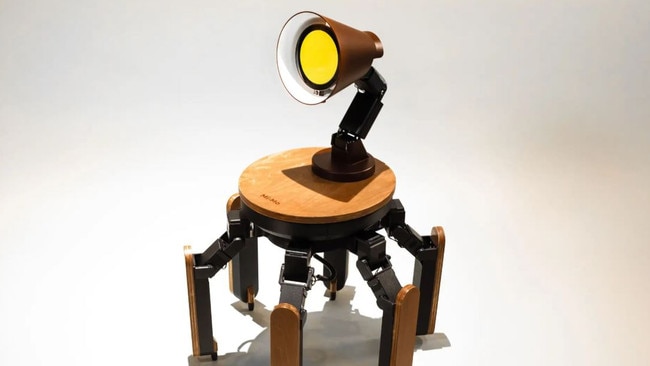
Oddest invention
Possibly the most bonkers invention at CES was the Mi-Mo.
It looks like a classic desk lamp sitting on a side table.
Except the side table can then wander around a room on legs and do jigs at people.
It has cameras and can respond to voice prompts. But, cute as it is, it felt like a solution in search of a problem.
The company that makes it, Jizai, has suggested it could remind children to do their homework or interact and watch over the elderly and infirm.
However, given the choice between a desk lamp on legs and a furry robot puppet as a companion, for most it would probably be the latter.
The reporter travelled to CES with the assistance of LG.
Originally published as CES 2025: Plastic spoon that costs $200, robot puppy, AI barbecue and other curious tech inventions




